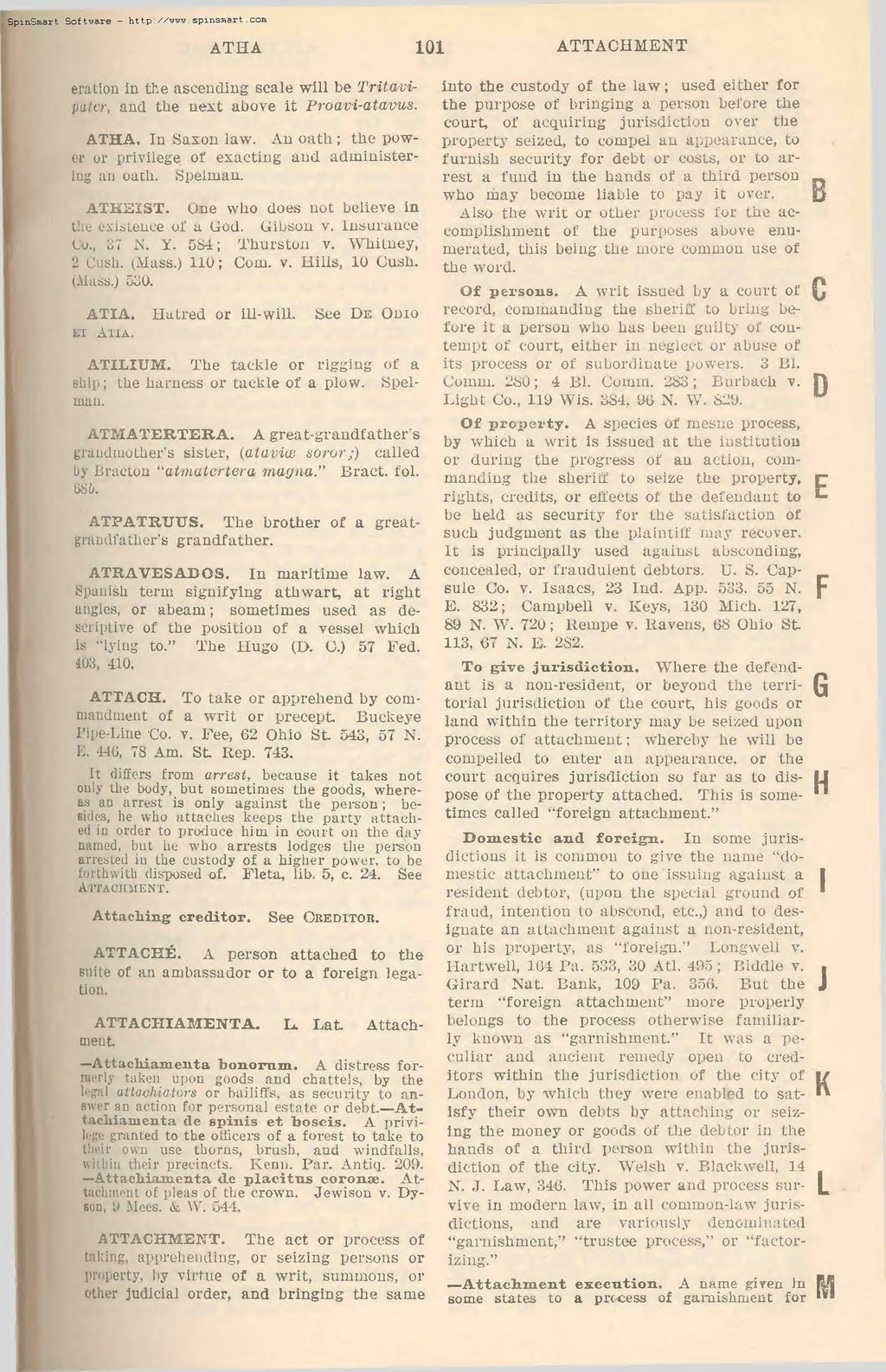eration in the ascending scale will be Tritavipater, and the next above it Proavi-atavus.
ATHA. in Saxon law. An oath; the power or privilege of exacting and administering an oath. Spelman.
ATHEIST. One who does not believe in the existence of a God. Gibson v. Insurance Co., 37 N. Y. 584; Thurston v. Whitney, 2 Dish (Mass.) 110; Com. v. Hills, 10 Cush. ulnar.) .3.-so.
ATIA. Hatred or iii-will. See Dr: Onro i:i ATLA. ATILIUM. The tackle or rigging of a
Mini; the harness or tackle of a plow. Spel- LLIIPE.
ATIVIATERTERA. Agreat-grandfather's i;iaudiuoI.her's sister. (atavw: soroi;) called 85' Lnicton "atmatcrtera magna." Bract. fol. I81
ATPATRUUS. The brother of a great- grun(lfaI.her‘s grandfather.
ATRAVESADOS. In maritime law. A spiinlsh term signifying athwnrt, at right uiigies, or abeam; sometimes used as de- atvliitive of the position of a vessei which in "iying to." The Hugo (D. 0.) 51' Fed. 103, 410.
ATTACH. To take or apprehend by com- niiniihiient on‘, a writ or precept Buckeye i'ilieLine Co. v. Fee. 62 Ohio St. 543, 57 N. |.'.- 4-10. 78 Am. St. Rep. 743.
it dificrs from arrest, because it takes not my the body, but sometimes the goods, where- as an arrest is only against the person; he
as, he who attaches keeps the party attach- ul in order to produce him in court on the my naiued, but he who arrests iodgos the person an-ruprl in the custody of a higher power, to he loulnitii disposed of. Fietn, lib. 5, c. 24. See £l'l'AC'flMEh"i‘.
Attaching creditor. See Oarmroa.
ATTACH.)-'1. A person attached to the dte of an ambassador or to a foreign lega- Lion.
ATTACHIAMENTA. L Lat. Attach- meat.
—Attach.iamenta lmno-nun. A distress formrrly t-il(en_ upon goods and chattels, by the hell llflllflh-illf0f8 or bailiffs, as security to anaoran nction for personal estate or debt.—Atinclxinmenta do spinis et ‘Iioscis. A privi- IQ ernnted to the officeis of a forest to take to
I can use thorns, brush, and wind is, Iflfi zteir precincts. Kenn. Par. Anfiq. Z09. -Jltlohiamentn tie plaoitns eorome. At- Olluni of pleas of the crown. Jewison v. Dy- It! I! i\iu,s. A’: W. 54-1.
ATTACHMENT. The act or process of Iiing, appiclieiidlug, or seizing persons or jluperty, by virtue of a writ, summons, or other judicial order, and bringing the same
101
ATTACHMENT
into the custody of the law; used either for the purpose of bringing a person before the court, of acquiring jurisdiction over the property seized, to compel an appeuiiince. to furnish security for debt or cosln, or to arrest a fund in the hands of a third person who may become iiable to pay it over.
Also the writ or other proc.-.:s for the itccomphshment of the purposes above enu- merated, this being the more common use or the won].
or persons. A writ issued by a court of record, commanding the sherifr‘ to bring be fore it a person who has been guilty or contempt of court, either in nogii---L or abuse of its process or of subordinate pow:-is 3 Bi. Comm. 230; 4 Bl. Comm. 384; Burbach v. Light Co., 119 Wis. 58-}, 96 N. ". 8'39.
or property. A species or mc- we process, by which a wut is issued at the institution or during the progress of an action, com- manding the sheriii to seize the property, rights, credits, or effects or the defendant to he held as security for the satisfaction of such judgment as the plainti may recover. it is principally used against tilJSLOi1(iiDg. concealed, or fraudulent debtors. U. S. Cap- sule Co. v. Isaacs, 23 ind. App. 533, :35 N. E. 832; Campbell v. Keys. 130 Mich. 127. 89 N. W. 720; Iiempe v. Ravens, 68 Ohio St. 113, 67 N. E. 282.
To give jurisdiction. Where the defend- ant is a non-resident, or beyond the Leriitorial jurisdiction of the court, his goods or land within the territory may be seized upon process of attachment; whereby he wfii be compeiied to enter an appeaiauce, or the court acquires jurisdiction so tar as to dispose of the property attached. This is sometimes called "foreign attachment."
Domestic and foreign. In some juris-
dictions it is common to give the name "do-
mestic attachment" to one issuing against a
resident debtor. (upon the special ground of
fraud, intention to ubscond, etc.,) and to designate an attachment against a non-resident,
oi- his propert_\', as "foreign." Longueli v.
Hartwell, 10-} 1’- . .'i}3, 30 At]. 49-3; Biddle v.
Glrard Nat. Bank, 199 Pa. 35('t But the
term "foreign attachment" more properly
belongs to the process otherwise familiar-
Lv known as "garnlshnient." It was a pc-
Luiiar and audent remedy open to med-
ltors within the jurisdiction of the city of
London, by which they were enabled to satisfy their own debts by ntmching or seizing the money or goods or the debtor in the
hands of a third person within the juris-
diction of the city. Welsh v. Blackwell, 14
N. J. Law, 346. This power and process sur-
vive in modern law, in all common-l-iw juris-
dictions, and are vnrionsiy denomln ited
",-garnishment," "trustee procc-.-s," or "motorizing."
—Attnchment execution. A name given in some states to a pr(cess of garnishment for
K
